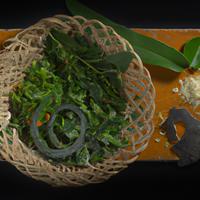
1 serving (100 grams) contains 64 calories, 9.4 grams of protein, 1.4 grams of fat, and 8.3 grams of carbohydrates.

Log this food in SnapCalorie

Nutrition Information
Calories |
160 | ||
|---|---|---|---|
% Daily Value* |
|||
| Total Fat | 3.5 g | 4% | |
| Saturated Fat | 0.8 g | 4% | |
| Polyunsaturated Fat | 0 g | ||
| Cholesterol | 0 mg | 0% | |
| Sodium | 22.5 mg | 0% | |
| Total Carbohydrates | 20.7 g | 7% | |
| Dietary Fiber | 5 g | 17% | |
| Sugars | 0 g | ||
| protein | 23.5 g | 47% | |
| Vitamin D | 0 mcg | 0% | |
| Calcium | 462.5 mg | 35% | |
| Iron | 10 mg | 55% | |
| Potassium | 842.5 mg | 17% | |
* Percent Daily Values are based on a 2,000 calorie diet. Your daily values may be higher or lower depending on your calorie needs.
Food Attributes
Source of Calories
About Malunggay leaves
Malunggay leaves, also known as Moringa leaves, are a nutrient-dense superfood widely used in Southeast Asian and Filipino cuisine. Originating from the Moringa oleifera tree, these small, vibrant green leaves are rich in essential vitamins and minerals, including vitamin C, vitamin A, calcium, potassium, and iron. They are also packed with antioxidants and boast anti-inflammatory properties, making them beneficial for boosting immunity, promoting heart health, and supporting overall wellness. High in fiber, malunggay leaves aid digestion and are commonly added to soups, stews, and teas, or dried to make powders for various recipes. While generally healthy, those with kidney-related issues should consume them in moderation due to their high potassium content. Known as "Nature’s Miracle Tree," malunggay continues to gain popularity globally for its diverse benefits and versatility in both traditional and modern dishes.



